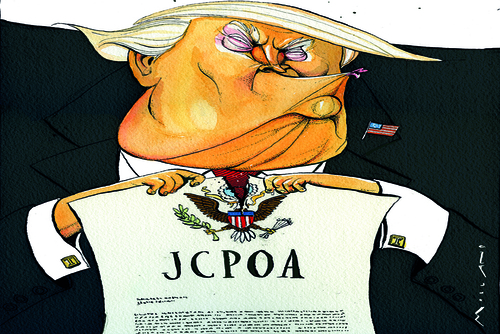
The NAFTA Negotiations: Put a Check on US Irrationality
The United States, Canada and Mexico have begun renegotiation of the North American Free Trade Agreement. In the first meeting, it was clear there was a divide between the U.S., which relentlessly pursued its own national interests, and Canada and Mexico, which sought to keep the U.S. in check. Hoping to reach an agreement by the end of the year, they’ve made arrangements for at least four more meetings, but the selfishness of the Trump administration knows no bounds. Thinking only of reducing its own trade deficit, the Trump administration continues to press its irrational trade policies onto the other two countries.
It’s highly possible that the course of the negotiations may have a negative impact on Japanese businesses that are expanding to Mexico in hope of exporting to the U.S. The Japanese government should put pressure on each of these three countries by appealing to the United States' self-respect and to Canada and Mexico’s fortitude.
NAFTA came into effect in 1994, and in 2008 it led to an increase in the gross domestic product of approximately $21 trillion (2,300 trillion yen) due to the annulment of various trade restrictions. Since his election campaign, Donald Trump has insisted that because of NAFTA, production bases have ended up relocating from the U.S. to Mexico, where wages are low. He states that this led to a loss in employment and an increased trade deficit − hence the implication that the U.S. simply needs to withdraw from the agreement.
In order to reduce its trade deficit and rejuvenate the state of its manufacturing industry, the U.S. is placing a high priority on the following two points during the renegotiations.
The first point is the amendment of the Rules of Origin, which determine to what percentage a product must be made from domestic parts before domestic tariffs are eliminated. Currently, for motor vehicles, tariffs are eliminated as long as over 62.5 percent of the product is supplied domestically. However, the U.S. aims to raise this percentage and increase the amount of American material used in order to increase employment. The other point the U.S. is aiming for is the introduction of a currency clause, which is an opposing measure that would guard against foreign currencies weakening and stems from their goal of reducing their trade deficit.
However, both points miss the mark. The biggest reason the U.S. manufacturing industry has declined so much is due to developments in automobile automatization and computerization. In addition, improving the balance of trade does not stem from exchange policies and reducing foreign trade, but from expanding foreign trade.
Of the Japanese businesses expanding to Mexico, there were more than 1,100 that concentrated on automotive-related production. In the upcoming renegotiations, the production networks of Japanese businesses will also be forced to undergo reconsideration. This is no time for Japan to remain on the sidelines.

